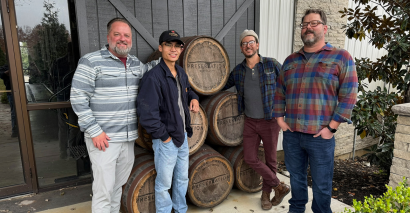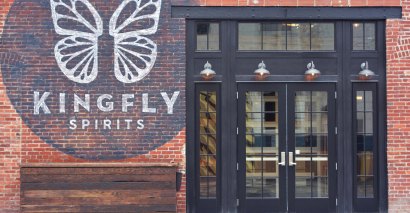_1290x670.jpg?resize=1920x0)
Chattanooga Whiskey Debuts a New Bourbon Finished in White Port Casks
February 20, 2024 –––––– Danny Brandon
Chattanooga Whiskey was founded in 2011, at a time when distilling in the city and its Hamilton County base wasn’t even legal. The start-up worked around that by using sourced whiskey while founders Tim Piersant and Joe Ledbetter lobbied with the Tennessee legislature to legalize distilling. On May 16, 2013 their efforts paid off, and Chattanooga has been a big part of Tennessee’s distilling revival ever since.
Chattanooga’s house style tends to favor high-malt bourbons, a relatively uncommon choice compared to the high-rye and wheated versions. The distillery’s latest expression aims to innovate with a not-too-commonly seen finish—the white port cask. Chattanooga White Port Cask Finished is a blend of three bourbons. While the exact grain ratios are undisclosed, each component follows a mashbill featured in a previous Chattanooga release:
- B005: Corn, dark malted wheat, caramel malted wheat, and oak-smoked malted wheat. It was originally used to make Chattanooga Experimental Batch 05: High Malted Wheat
- SB091: Chattanooga Single Barrel 91’s recipe, encompassing yellow corn, malted rye, caramel malted barley, and honey-malted barley.
- R18016: yellow corn, green malted barley, and malted red wheat. It was created for a one-off expression but was also used as part of the recipe for Bottled in Bond Vintage Series (Spring 2017).
The blend was aged for 5 years total, with the final two spent in white port casks sourced from the Carrazeda de Ansiães region of Portugal. The whiskey was bottled at 47.5% ABV.

This is the fourth expression in Chattanooga’s annual Barrel Finishing Series, which debuted in 2021 as a way to showcase cask finishing. It follows whiskeys finished in silver oak cabernet casks, smoky Islay scotch casks, and tawny port casks. The series largely builds off the success Chattanooga had with earlier cask-finished whiskeys, released as part of its super limited Experimental Batches collection.
While both of those series feature cask-finished expressions, there is a key difference between the two: the Experimental Batches series is made at Chattanooga’s Experimental Distillery, the company’s first home. The annual Barrel Finishing series is made at Chattanooga’s Riverfront Distillery, the newer and much larger of the two facilities which opened in March 2017. The riverfront facility also produces the label’s flagship 91 and Cask 111 bourbons, 99 rye whiskey, and Bottled in Bond Vintage Series.
The Experimental Distillery is the visitor epicenter for Chattanooga, with tours and tastings offered, while Riverfront is the workhorse, with no visitor tours available.
Chattanooga White Port Cask Finished comes at a suggested retail price of $60 and is available at retailers across 10 states: Florida, Georgia, Illinois, Indiana, Kentucky, Louisiana, South Carolina, Tennessee, Texas, and Wisconsin. A number of bottles will also be available for purchase at the Experimental Distillery, with online sales via seelbachs.com slated to launch later this month.
White port is far less widely used than the typical red ports beloved by wine and whisky enthusiasts, representing about 10% of overall port production. Both come from the Douro Valley region of Portugal, but the white variety is made from native white grapes. We’ve seen the Scots take a stab at using these casks, with expressions from Glencadam, Glen Scotia, Laphroaig, and Tomintoul, among others.




